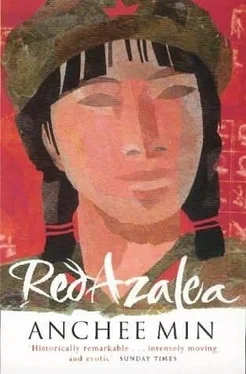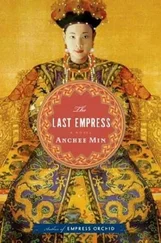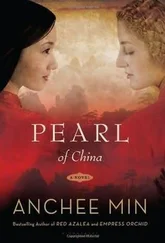
© 1993
Thank you:
Sandra Dijkstra, my agent, for your discovery.
Joan Chen, my comrade-in-arms, for your inspiration.
Xian-Ming Yuan, for your enlightenment since Shanghai 51st Middle School.
Michele Dremmer, for your affection.
Diana and Richard K. M. Eu, my aunt and uncle; Mr. S. G. Lee of the Singapore Lee Foundation; and Harris Meyer and Deborah Mihm, for your sincere support.
Michele Smith, for helping me with my English since I arrived in the United States.
Vincent Yip, my brother-in-law, for being my “walking dictionary.”
Yan-Fang Jiang and Ci-Feng Zhang, my parents-in-law, for baby-sitting Lauryan.
Julie Grau, for your energy and for your faith in the book.
Dan Frank, my editor, thank you.
I have translated the Chinese names according to their original meaning instead of transcribing them phonetically. I have changed some names in order to protect lives.
I never expected that the message in Red Azalea would still be significant ten years after its publication. The Communist government of China continues to deny its past. Children today know Mao as a hero instead of the one who should be held responsible for the Cultural Revolution (1964-1976), which brought destruction to every family in the nation and took millions of lives.
In America I have tried to bury my own memories. Yet, I see Little Green’s drowned face in the fireworks on the Fourth of July. Every time I visit the toilet I remember how I used to squat on a thin, wet board over a manure-pit with millions of maggots swimming below me and my fear of falling in. Every time I have loved, I hear the sound of a bullet and am reminded of the price of falling in love at the labor camp and what happened to those who paid for passion.
My young American-born daughter’s dream of becoming the one who would help to discover the cure for cancer reminds me of my own childhood dream of devoting myself to protecting my country. I wanted to tie grenades to my body and become a martyr by blowing up the Vietnam invaders, the Americans.
It saddens me to see that the Chinese historians echo the government’s line, which calls the Cultural Revolution “Mao’s tiny flaw,” in other words, “Not worthy of mentioning.”
I haven’t taken the publication of Red Azalea for granted, because I know that millions of my people did not live to tell their stories.
The record of history is set by the powerful. While I credit the Communist government for China’s economic success, I despise its attitude toward the past. I consider the regime’s new slogan, “Comrades, let’s move on,” which translates as, “Let’s forget about the Cultural Revolution,” an act of betrayal against humanity.
Wrapped in fancy neon lights, our soul’s landscape is a ruin and is infected with disease. We hope that the sickness won’t show and the tumor won’t grow and spread. What could be more frightening? How long will it be until the unlearned lesson repeats itself?
When I wrote Red Azalea I didn’t realize that it not only told a story of a girl named Jade of Peace, Anchee Min, but also the story of China, its yesterday, today, and tomorrow.
Anchee Min, 2005
I was raised on the teachings of Mao and on the operas of Madam Mao, Comrade Jiang Ching. I became a leader of the Little Red Guards in elementary school. This was during the Great Proletarian Cultural Revolution when red was my color. My parents lived like-as the neighbors described them-a pair of chopsticks: always in harmony. My father was an instructor of industrial technique drawing at Shanghai Textile Institute, although his true love was astronomy. My mother was a teacher at a Shanghai middle school. She taught whatever the Party asked, one semester in Chinese and the next in Russian. My parents both believed in Mao and the Communist Party, just like everybody else in the neighborhood. They had four children, each one a year apart. I was born in 1957. We lived in the city, on South Luxuriant Road in a small two-story townhouse occupied by two families. The house was left by my grandfather, who had died of tuberculosis right before I was born.
I was an adult since the age of five. That was nothing unusual. The kids I played with all carried their family’s little ones on their backs, tied with a piece of cloth. The little ones played with their own snot while we played hide-and-seek. I was put in charge of managing the family because my parents were in their working units all day, just like everyone else’s parents.
I called my sisters and brother my children because I had to pick each one of them up from kindergarten and nursery school while I myself was only a kindergartner. I was six when my sister Blooming was five, my second sister Coral was four and my brother Space Conqueror was three. My parents made careful choices in the names they gave us. They were considered eccentric because the neighbors named their children Guard of Red, Big Leap, Long March, Red Star, Liberation, Revolution, New China, Road of Russia, Resist U.S., Patriotic Forerunner, Matchless Red Soldier, etc. My parents had their own ideas. First they called me Lin-Shuan-Rising Sun at a Mountain. They dropped it because Mao was considered the only sun. After further contemplation, they named me Anchee-Jade of Peace. Also, it sounded like the Chinese pronunciation of the English word “angel.” They registered me with it. Blooming and Coral were named after the sound of chee (jade). There were two reasons why my parents named my brother Space Conqueror: one was that my father loved astronomy; the second was to respond to Mao’s call that China would soon build its own spaceship.
As I understood it, my parents were doing work that was saving the world. Every evening I would pick up the children and fight with the kids on the block all the way home. It was like eating a regular meal that I got a purple cheek or a bloody nose. It did not bother me too much. Although I was scared of crossing at traffic lights and dark alleys, I learned to not show my fear, because I had to be a model for the children, to show them what bravery meant. After I arranged for the children to play by themselves in the living room, I went to set up the stove to cook dinner. It always took me a long time to light the stove, because I did not understand that wood and coals needed air to burn. I stuffed the stove as I sang songs of Mao quotations. One time, when I tried many times and the stove would not light, I lost my patience. I went out to play, thinking that the stove was not burning. Then a kid came and told me that there was smoke coming out of our house window. This happened three times.
I tried to put the children to sleep while the sky was still bright. The children’s little feet kicked the cotton blankets and made new holes over the old. The blankets soon became rags. When the room quieted down, I would lean on the windowsill staring at the entrance to the lane, waiting for my parents to appear. I watched the sky turn deep blue, Venus rising, and I would fall asleep by the window.
In 1967, when I was ten years old, we moved. It was because our downstairs neighbor accused us of having a bigger space than they had. They said, How can a family of six occupy four rooms while a family of eleven has only one? The revolution is about fairness. They came up with chamber pots and poured shit on our blankets. There were no police. The police station was called a revisionist mechanism and had been shut down by the revolutionaries. The Red Guards had begun looting houses. No one answered our call for help. The neighbors just watched.
Читать дальше













